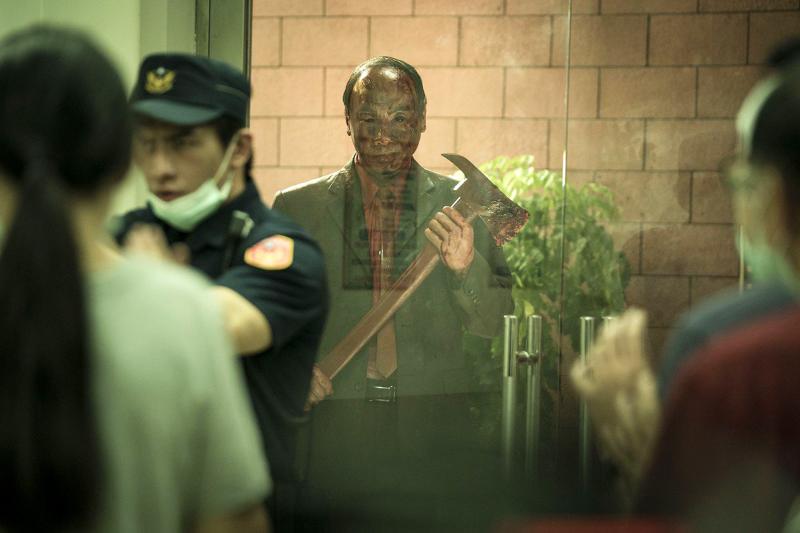If you’re squeamish about intentionally campy, senselessly gory zombie-style bloodfests, stay away from this film.
This reviewer is no fan of the genre, but somehow, between the smooth production, excellent death metal-meets Taiwanese temple music soundtrack, fast paced action and not-so-subtle digs at the government and humanity, The Sadness (哭悲) proved to be mildly entertaining.
The social parody is not as relentless and biting as last August’s Get The Hell Out (逃出立法院), where the nation’s entire legislative body transforms into zombies, but that one was somewhat bogged down by very specific Taiwanese cultural references that could only be appreciated by a familiarity with the nation’s pop culture and sociopolitical events. You don’t need to know that much to understand The Sadness, just sit back and enjoy the crazy rampages and flying guts.

Photo courtesy of iFilm
Set in an anti-Taiwan where the government has chosen to downplay and ignore the potential effects of an ongoing “Alvin Virus” pandemic despite warnings from leading virologists, the virus suddenly mutates and starts turning people into sadistic, bloodthirsty, cannibalistic and lustful maniacs.
What’s interesting here is that the infected still retain their sentience and control over their bodies. They’ve just completely given into their worst tendencies and desires — which makes them way creepier and more dangerous than the typical brainless, bumbling zombie. Even worse, a virologist suggests at one point that they may still be aware of what they’re doing, they just can’t control it anymore — it’s like fighting the urge to blink, he says.
The film opens with lead couple Jack (Berant Chu 朱軒洋) and Kat (Regina,雷嘉納), who are separated when Kat heads to her job in Taipei and Jack stays in their cozy Keelung home. The violence erupts across Taiwan shortly after, and the two try to find each other amid the chaos. That’s about it to the plot (and their relationship) and there’s almost no character development or depth, but director Rob Jabbaz does a decent job in using extreme effects, eerie moods and disturbing dialogue and behavior to carry the film through.

Photo courtesy of iFilm
While Hollywood zombies have most aspects of their humanity removed as they commit their carnage, the infected lunatics here are driven by their all-too-human darker sides. For example, Kat’s primary pursuer (Wang Tzu-chiang, 王自強) is fixated on her since she rejected his advances earlier on the MRT. This is the common theme that emerges from the bloodbath and gives the viewers at least something to, um, chew on.
There’s not much acting skill needed to portray the terrorized and panicking “good guys” in such a film and the two leads do a satisfactory job (it’s Regina’s feature debut). And while some may complain that the behaviors of the infected are too crass and inappropriate, the point of the film is to exaggerate the vileness buried in our hearts.
Kudos to IF SFX Art Maker (覺藝工作室特效化妝) for the special effects (they also worked on Get The Hell Out among other movies). They’ve managed to even make the most extreme scenes look believable and not cheesy, which is something that could make or break the film.
This kind of film is not meant to make much logical sense, and although there are some questionable points, what’s presented is watchable enough. But shiny production, an intriguing concept and a willingness to go beyond what’s normally acceptable isn’t what makes a movie memorable. There’s tons of potential — and value — here, but the oversimplified plot and lack of attention to storytelling nuances and details is notable.

March 2 to March 8 Gunfire rang out along the shore of the frontline island of Lieyu (烈嶼) on a foggy afternoon on March 7, 1987. By the time it was over, about 20 unarmed Vietnamese refugees — men, women, elderly and children — were dead. They were hastily buried, followed by decades of silence. Months later, opposition politicians and journalists tried to uncover what had happened, but conflicting accounts only deepened the confusion. One version suggested that government troops had mistakenly killed their own operatives attempting to return home from Vietnam. The military maintained that the

Taiwan has next to no political engagement in Myanmar, either with the ruling military junta nor the dozens of armed groups who’ve in the last five years taken over around two-thirds of the nation’s territory in a sprawling, patchwork civil war. But early last month, the leader of one relatively minor Burmese revolutionary faction, General Nerdah Bomya, who is also an alleged war criminal, made a low key visit to Taipei, where he met with a member of President William Lai’s (賴清德) staff, a retired Taiwanese military official and several academics. “I feel like Taiwan is a good example of

Jacques Poissant’s suffering stopped the day he asked his daughter if it would be “cowardly to ask to be helped to die.” The retired Canadian insurance adviser was 93, and “was wasting away” after a long battle with prostate cancer. “He no longer had any zest for life,” Josee Poissant said. Last year her mother made the same choice at 96 when she realized she would not be getting out of hospital. She died surrounded by her children and their partners listening to the music she loved. “She was at peace. She sang until she went to sleep.” Josee Poissant remembers it as a beautiful

Before the last section of the round-the-island railway was electrified, one old blue train still chugged back and forth between Pingtung County’s Fangliao (枋寮) and Taitung (台東) stations once a day. It was so slow, was so hot (it had no air conditioning) and covered such a short distance, that the low fare still failed to attract many riders. This relic of the past was finally retired when the South Link Line was fully electrified on Dec. 23, 2020. A wave of nostalgia surrounded the termination of the Ordinary Train service, as these train carriages had been in use for decades